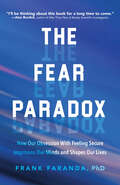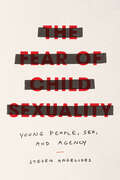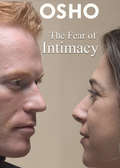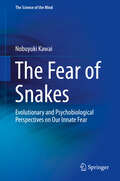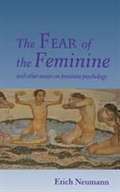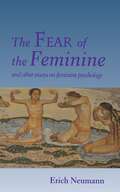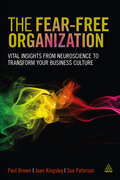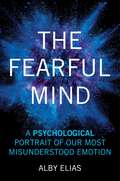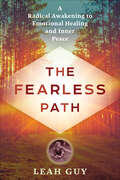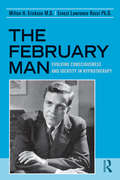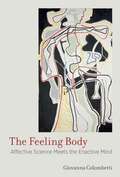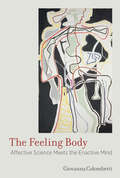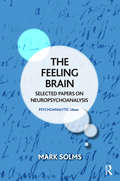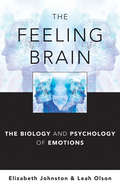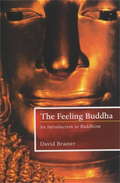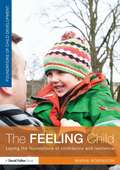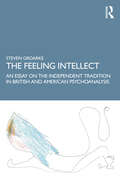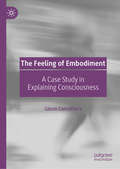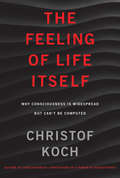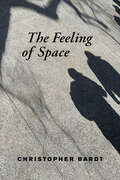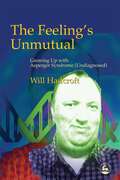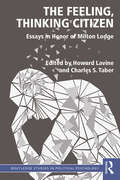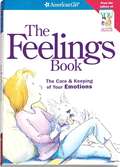- Table View
- List View
The Fear Paradox: How Our Obsession With Feeling Secure Imprisons Our Minds and Shapes Our Lives
by Frank FarandaFear in Contemporary Society and its Consequences“A delightfully fearless and deeply sensitive examination of that most primal and formative human experience.” ―Alan Burdick, author of Why Time Flies: A Mostly Scientific Investigation#1 New Release in Evolutionary Psychology and BuddhismFor anyone suffering from global pandemic anxiety caused by the new coronavirus, comes an exploration of one of the most powerful and primitive human emotions.A history and culture of fear. Over the last five hundred years, life for the average human being has changed dramatically―plagues no longer routinely wipe out entire families, and we no longer empty our chamber pots into the street. But, progress has shown that no matter how many dangers we neutralize, new ones emerge. Why? Because our level of fear remains constant.Fear in contemporary society. For years, Dr. Frank Faranda studied a state of fearfulness in his patients―an evolutionary state that relentlessly drove them toward avoidance, alienation, hypercriticism, hyper-control, and eventually, depression and anxiety. He began to wonder what they were afraid of, and how embedded these fears might be in contemporary society. This book aims to break us free from what he found.Fear not. Faranda’s Fear Paradox is simple―even though fear has a prime directive to keep us safe and comfortable, it has grown into the single greatest threat to humanity and collective survival. As a consequence, fear is embedded in our culture, creating new dangers and inciting isolation. With rising anxiety levels, now is the time to shine a light on our deepest fears and examine the society that fear is creating.But fear not―inside, you’ll learn about:The fear of pain and the fear of the unknownHow fear has driven progress in the WestThe price paid to eradicate fearRead books like Fear, The Culture of Fear, or The Science of Fear? Then The Fear Paradox is your next read. Come on, what are you afraid of?
The Fear of Child Sexuality: Young People, Sex, and Agency
by Steven AngelidesContinued public outcries over such issues as young models in sexually suggestive ads and intimate relationships between teachers and students speak to one of the most controversial fears of our time: the entanglement of children and sexuality. In this book, Steven Angelides confronts that fear, exploring how emotional vocabularies of anxiety, shame, and even contempt not only dominate discussions of youth sexuality but also allow adults to avoid acknowledging the sexual agency of young people. Introducing case studies and trends from Australia, the United Kingdom, and North America, he challenges assumptions on a variety of topics, including sex education, age-of-consent laws, and sexting. Angelides contends that an unwillingness to recognize children’s sexual agency results not in the protection of young people but in their marginalization.
The Fear of Intimacy
by Osho Osho International FoundationIntimacy generally refers to the feeling of being in a close personal association and belonging together. Everybody is afraid of intimacy. It is another thing whether we are aware of it or not. Intimacy means exposing yourself before a stranger. We are all strangers -- nobody knows anybody. We are even strangers to ourselves, because we don't know who we are.This talk by Osho is an invitation to discover who you are.
The Fear of Snakes: Evolutionary and Psychobiological Perspectives on Our Innate Fear (The Science of the Mind)
by Nobuyuki KawaiThis book provides a series of compelling evidence that shows that humans have innate fear of snakes. Building on the previous studies on the Snake Detection Theory (SDT), the author presents a summary of psychological and neuropsychological experiments to explain the fear of snakes in humans and primates. Readers will come to understand why and how we are afraid of snakes from an evolutionary perspective.The first half of the book discusses the history of psychological behaviorism and neobehaviorism. The latter half of the book consists mainly of the experimental studies performed by the author with a focus on three key items: First, compared with other animals, snakes especially draw the attention of primates and humans. Second, the ability of primates and humans to recognize snakes with particular efficiency. Third, processing mechanisms within the brain for snake detection is discussed from a new viewpointThe book offers a unique resource for all primatologists, psychologists, neuroscientists, anthropologists, herpetologists, and biologists who are interested in the evolution of visual and cognitive systems, mechanisms of fear, snakes or primates.
The Fear of the Feminine and Other Essays on Feminine Psychology (Bollingen Series LXI #4)
by Erich NeumannThese essays by the famous analytical psychologist and student of creativity Erich Neumann belong in the context of the depth psychology of culture and reveal a prescient concern about the one-sidedness of patriarchal Western civilization. Neumann recommended a "cultural therapy" that he thought would redress a "fundamental ignorance" about feminine and masculine psychology, and he looked for societal healing to a "matriarchal consciousness" that forms the bridge between the feminine and the creative. Brought together here for the first time, the essays in the book discuss the psychological stages of woman's development, the moon and matriarchal consciousness, Mozart's Magic Flute, the meaning of the earth archetype for modern times, and the fear of the feminine. In Mozart's fantastic world, Neumann saw a true Auseinandersetzung--the conflict and coming-to-terms with each other of the matriarchal and the patriarchal worlds. Developing such a synthesis of the feminine and the masculine in the psychic reality of the individual and of the collective was, he argued, one of the fundamental, future-oriented tasks of both the society and the individual.
The Fear of the Feminine: And Other Essays on Feminine Psychology (Works by Erich Neumann #22)
by Erich NeumannThese essays by the famous analytical psychologist and student of creativity Erich Neumann belong in the context of the depth psychology of culture and reveal a prescient concern about the one-sidedness of patriarchal Western civilization. Neumann recommended a "cultural therapy" that he thought would redress a "fundamental ignorance" about feminine and masculine psychology, and he looked for societal healing to a "matriarchal consciousness" that forms the bridge between the feminine and the creative. Brought together here for the first time, the essays in the book discuss the psychological stages of woman's development, the moon and matriarchal consciousness, Mozart's Magic Flute, the meaning of the earth archetype for modern times, and the fear of the feminine. In Mozart's fantastic world, Neumann saw a true Auseinandersetzung--the conflict and coming-to-terms with each other of the matriarchal and the patriarchal worlds. Developing such a synthesis of the feminine and the masculine in the psychic reality of the individual and of the collective was, he argued, one of the fundamental, future-oriented tasks of both the society and the individual.
The Fear-free Organization
by Paul Brown Sue Paterson Joan KingsleyLeadership that makes a difference takes guts and confidence, plus belief in oneself and belief in the key players in the organization. It is built on trust, not fear. Scared people spend a lot more time plotting their survival than working productively, so The Fear- Free Organization has zero tolerance for bullies, vicious gossip, undermining behaviours, hijacking tactics, political jockeying for position or favouritism. Instead, it works on inspiration. Evidence from the new frontiers of neuroscience shows that individuals and organizations are more successful when people are encouraged to take risks, to explore new ideas, and to channel their energies in ways that work for them. The The Fear -Free Organization is a ground-breaking new book that reveals how our new understanding of the neurobiology of the self - how the brain constructs the person - can transform for the better the way our businesses and organizations work.
The Fearful Mind: A Psychological Portrait of Our Most Misunderstood Emotion
by Alby EliasFear is a universal emotion and is typically depicted as a despicable one. While fear is regarded as nature&’s imperfect wisdom, often undesirable, and a sign of weakness, its role in maintaining human life is overlooked. In the middle of ubiquitous repulsion against fear, there is minuscule literature on the beneficial effects of fear and the consequences of fearlessness. Recent research has thrown light into the unconscious processing of fear. In sharp contrast to the existing literature, this book argues that fear, overriding all other emotions, operates relentlessly in the unconscious mind as a motivating force and renders life compatible with survival. Fear appeals can bring healthy behavioral changes; the stronger the appeal, the more persuasive it is. Moderate anxiety can improve performance that involves dominant responses. Social anxiety is regarded as the root cause of conscientiousness. This hypothesis is supported by the latest research that reveals impaired fear processing in patients with psychopathy, a condition that is associated with crimes. This book expands the concept of eustress, a positive reaction to stress, and describes the beneficial aspects of fear. The book gives a twist to the conventional view of fear as an unwanted emotion and draws a new hypothesis that fear is the primary emotion and a constant psychological operative, a lack of which poses dangerous consequences.
The Fearless Path: A Radical Awakening to Emotional Healing and Inner Peace
by Leah Guy“A remarkable toolkit of proven strategies to address the root cause of cravings, addictions, anxiety, and guilt.” —Ann Louise Gittleman, PhD, CNS, New York Times–bestselling author of The New Fat Flush PlanLeah Guy believes that disconnection is the root of all fear, and the attempt at letting go causes more problems than it solves. Debunking the myth of detachment and other popular New Age ideologies, she emphasizes that there’s no escapism in emotional healing. Rather, the process is about putting the personal pieces of your heart, mind, and soul back together again. The Fearless Path offers a radical approach that will heal trauma, fear, heartache, and mental and physical health.Overcoming anxiety, sexual abuse, eating disorders, and addiction using the principles in this book, Leah has spent her life helping others find relief and freedom from personal afflictions.In The Fearless Path, you will learn:Why “letting go” is the worst advice for healing, and how to really move on.How to understand the stories your energy system tells about your mind, body, and spirit—and how to rewrite the script.How to transform fear and anxiety into love and inner peace.Why the law of attraction isn’t all it’s cracked up to be.Find strength and serenity in the midst of a personal storm.“An inspirational guide for true self-healing through practical exercises and profound understandings.” —Susan Shumsky, DD, author of The Power of Chakras and Awaken Your Third Eye“Based on her own profound self-healing, Leah Guy offers a wellspring of inspiration and a cornucopia of practical tools. Highly recommended!” —Michael Gelb, author of How to Think Like Leonardo da Vinci
The February Man: Evolving Consciousness and Identity in Hypnotherapy
by Milton H. Erickson Ernest Lawrence RossiThis book is a fascinating case study that illustrates the use of multiple levels of consciousness and meaning to access and therapeutically reframe traumatic memories that were the source of very severe phobias and depression. A rare record of Erickson's pioneering genius in facilitating the evolution of new patterns of consciousness and identity in a patient.
The Federalist Papers
by Jason Xidias Jeremy KleidostyThe 85 essays that maker up The Federalist Papers’ clearly demonstrate the vital importance of the art of persuasion. Written between 1787 and 1788 by three of the “Founding Fathers” of the United States, the Papers were written with the specific intention of convincing Americans that it was in their interest to back the creation of a strong national government, enshrined in a constitution – and they played a major role in deciding the debate between proponents of a federal state, with its government based on central institutions housed in a single capital, and the supporters of states’ rights. The papers’ authors – Alexander Hamilton, James Madison, and John Jay – believed that centralised government was the only way to knit their newborn country together, while still preserving individual liberties. Closely involved with the politics of the time, they saw a real danger of America splintering, to the detriment of all its citizens. Given the fierce debates of the time, however, Hamilton, Jay and Madison knew they had to persuade the general public by advancing clear, well-structured arguments – and by systematically engaging with opposing points of view. By enshrining checks and balances in a constitution designed to protect individual liberties, they argued, fears that central government would oppress the newly free people of America would be allayed. The constitution that the three men helped forge governs the US to this day, and it remains the oldest written constitution, still in force, anywhere in the world.
The Feeling Body
by Giovanna ColombettiIn The Feeling Body, Giovanna Colombetti takes ideas from the enactive approach developed over the last twenty years in cognitive science and philosophy of mind and applies them for the first time to affective science -- the study of emotions, moods, and feelings. She argues that enactivism entails a view of cognition as not just embodied but also intrinsically affective, and she elaborates on the implications of this claim for the study of emotion in psychology and neuroscience. In the course of her discussion, Colombetti focuses on long-debated issues in affective science, including the notion of basic emotions, the nature of appraisal and its relationship to bodily arousal, the place of bodily feelings in emotion experience, the neurophysiological study of emotion experience, and the bodily nature of our encounters with others. Drawing on enactivist tools such as dynamical systems theory, the notion of the lived body, neurophenomenology, and phenomenological accounts of empathy, Colombetti advances a novel approach to these traditional issues that does justice to their complexity. Doing so, she also expands the enactive approach into a further domain of inquiry, one that has more generally been neglected by the embodied-embedded approach in the philosophy of cognitive science.
The Feeling Body: Affective Science Meets the Enactive Mind (The\mit Press Ser.)
by Giovanna ColombettiA proposal that extends the enactive approach developed in cognitive science and philosophy of mind to issues in affective science.In The Feeling Body, Giovanna Colombetti takes ideas from the enactive approach developed over the last twenty years in cognitive science and philosophy of mind and applies them for the first time to affective science—the study of emotions, moods, and feelings. She argues that enactivism entails a view of cognition as not just embodied but also intrinsically affective, and she elaborates on the implications of this claim for the study of emotion in psychology and neuroscience. In the course of her discussion, Colombetti focuses on long-debated issues in affective science, including the notion of basic emotions, the nature of appraisal and its relationship to bodily arousal, the place of bodily feelings in emotion experience, the neurophysiological study of emotion experience, and the bodily nature of our encounters with others. Drawing on enactivist tools such as dynamical systems theory, the notion of the lived body, neurophenomenology, and phenomenological accounts of empathy, Colombetti advances a novel approach to these traditional issues that does justice to their complexity. Doing so, she also expands the enactive approach into a further domain of inquiry, one that has more generally been neglected by the embodied-embedded approach in the philosophy of cognitive science.
The Feeling Brain: Selected Papers on Neuropsychoanalysis (Psychoanalytic Ideas Ser.)
by Mark SolmsNeuropsychoanalysis is the fastest growing area within psychoanalysis, providing a bridge between "classic" psychoanalysis and the neurological sciences. This book provides an accessible introduction to the field through a selection of papers by one of its leading figures. It includes papers on the theoretical and philosophical foundations of neuropsychoanalysis, scientific papers on the brain mechanisms of dreaming and consciousness, the application of neuropsychoanalysis in psychiatry and neurology, and clinical case studies.
The Feeling Brain: The Biology and Psychology of Emotions
by Elizabeth Johnston Leah OlsonA reader-friendly exploration of the science of emotion. After years of neglect by both mainstream biology and psychology, the study of emotions has emerged as a central topic of scientific inquiry in the vibrant new discipline of affective neuroscience. Elizabeth Johnston and Leah Olson trace how work in this rapidly expanding field speaks to fundamental questions about the nature of emotion: What is the function of emotions? What is the role of the body in emotions? What are "feelings," and how do they relate to emotions? Why are emotions so difficult to control? Is there an emotional brain? The authors tackle these questions and more in this "tasting menu" of cutting-edge emotion research. They build their story around the path-breaking 19th century works of biologist Charles Darwin and psychologist and philosopher William James. James's 1884 article "What Is an Emotion?" continues to guide contemporary debate about minds, brains, and emotions, while Darwin's treatise on "The Expression of Emotions in Animals and Humans" squarely located the study of emotions as a critical concern in biology. Throughout their study, Johnston and Olson focus on the key scientists whose work has shaped the field, zeroing in on the most brilliant threads in the emerging tapestry of affective neuroscience. Beginning with early work on the brain substrates of emotion by such workers such as James Papez and Paul MacLean, who helped define an emotional brain, they then examine the role of emotion in higher brain functions such as cognition and decision-making. They then investigate the complex interrelations of emotion and pleasure, introducing along the way the work of major researchers such as Antonio Damasio and Joseph LeDoux. In doing so, they braid diverse strands of inquiry into a lucid and concise introduction to this burgeoning field, and begin to answer some of the most compelling questions in the field today. How does the science of "normal" emotion inform our understanding of emotional disorders? To what extent can we regulate our emotions? When can we trust our emotions and when might they lead us astray? How do emotions affect our memories, and vice versa? How can we best describe the relationship between emotion and cognition? Johnston and Olson lay out the most salient questions of contemporary affective neuroscience in this study, expertly situating them in their biological, psychological, and philosophical contexts. They offer a compelling vision of an increasingly exciting and ambitious field for mental health professionals and the interested lay audience, as well as for undergraduate and graduate students.
The Feeling Buddha: An Introduction to Buddhism
by David BrazierThis account explains how the Buddha's path of wisdom and loving kindness grew out of the challenges he encountered in life. It explores enlightenment, nirvana, and the Four Noble Truths, presenting a picture of the Buddha as a very human figure whose success lay not in his perfection, but in his method of positively utilizing the energy generated by personal suffering.
The Feeling Buddha: An Introduction to Buddhism
by David BrazierThis account explains how the Buddha's path of wisdom and loving kindness grew out of the challenges he encountered in life. It explores enlightenment, nirvana, and the Four Noble Truths, presenting a picture of the Buddha as a very human figure whose success lay not in his perfection, but in his method of positively utilizing the energy generated by personal suffering.
The Feeling Child: Laying the foundations of confidence and resilience
by Maria RobinsonWhat impact does children’s emotional development and well-being have on their capacity to learn? How do you provide learning experiences that meet the developmental needs of every child in your care? The Feeling Child thoughtfully discusses the key principles of children’s emotional and behavioural development alongside descriptions of everyday practice. It clearly explains how a child’s early experiences influence their particular behaviours towards different people and different situations. Throughout the book, Maria Robinson considers the key characteristics of effective learning and shows how play is one of the key mechanisms that children use in their discovery of themselves and the world around them. These characteristics are then applied to integral aspects of early years practice to help practitioners to: support children to come to new understandings in safe yet challenging ways understand the ways in which children may approach or withdraw from learning opportunities reflect on their own teaching methods to encourage children’s engagement, motivation and creativity through effective observation and planning engage with parents and carers to help support children’s learning at home whilst maintaining the values of the family. celebrate the uniqueness of each child and provide learning experiences that are appropriate for individuals with particular learning needs, be they physical, emotional or cognitive to ensure that every child has an equal opportunity to succeed. Emphasising the importance of understanding the theory that underpins children’s emotional development, this accessible text shows practitioners how they can use this knowledge to provide learning opportunities that nourish children’s thinking and creative skills.
The Feeling Intellect: An Essay on the Independent Tradition in British and American Psychoanalysis
by Steven GroarkeIn The Feeling Intellect, Steven Groarke explores the overlap between psychoanalysis and philosophy in order to provide the first critical evaluation of the Independent tradition in British and American psychoanalysis. The book focuses on the formation of Independent object-relations theory as an original mid- to late-twentieth-century development in post-Freudian psychoanalysis, focusing on contributions by Fairbairn, Winnicott, Loewald, and others to add to our understanding of what the author terms the dependence relationship: the earliest relationship between mother and infant. The theory of acts and relations provides the basic framework for more detailed discussions of the psychoanalysis of time, including, Loewald’s idea of the inner future and the role of re-descriptive memory as a type of reclamation. This book is aimed at a readership intent on exploring the philosophical aspects of contemporary psychoanalysis in more detail. It will be of great value to psychoanalysts, psychotherapists, and students studying psychology.
The Feeling of Embodiment: A Case Study in Explaining Consciousness
by Glenn CarruthersThis book proposes a novel and rigorous explanation of consciousness. It argues that the study of an aspect of our self-consciousness known as the ‘feeling of embodiment’ teaches us that there are two distinct phenomena to be targeted by an explanation of consciousness. First is an explanation of the phenomenal qualities – 'what it is like' – of the experience; and second is the subject's awareness of those qualities. Glenn Carruthers explores the phenomenal qualities of the feeling of embodiment using the tools of quality spaces, as well as the subject's awareness of those qualities as a functionally emergent property of various kinds of processing of these spaces. Where much recent work on consciousness focuses on visual experience, this book rather draws evidence from the study of self-consciousness. Carruthers argues that in light of recent methodological discoveries, awareness must be explained in terms of the organization of multiple cognitive processes. The book offers an explanation of anomalous body representations and, from that, poses a more general theory of consciousness. Ultimately this book creates a hybrid account of consciousness that explains phenomenology and awareness using different tools. It will be of great interest to all scholars of psychology and philosophy as well as anyone interested in exploring the intricacies of how we experience our bodies, what we are and how we fit into the world.
The Feeling of Life Itself: Why Consciousness Is Widespread but Can't Be Computed (The\mit Press Ser.)
by Christof KochAn argument that consciousness, more widespread than previously assumed, is the feeling of being alive, not a type of computation or a clever hack.In The Feeling of Life Itself, Christof Koch offers a straightforward definition of consciousness as any subjective experience, from the most mundane to the most exalted—the feeling of being alive. Psychologists study which cognitive operations underpin a given conscious perception. Neuroscientists track the neural correlates of consciousness in the brain, the organ of the mind. But why the brain and not, say, the liver? How can the brain, three pounds of highly excitable matter, a piece of furniture in the universe, subject to the same laws of physics as any other piece, give rise to subjective experience? Koch argues that what is needed to answer these questions is a quantitative theory that starts with experience and proceeds to the brain. In The Feeling of Life Itself, Koch outlines such a theory, based on integrated information.Koch describes how the theory explains many facts about the neurology of consciousness and how it has been used to build a clinically useful consciousness meter. The theory predicts that many, and perhaps all, animals experience the sights and sounds of life; consciousness is much more widespread than conventionally assumed. Contrary to received wisdom, however, Koch argues that programmable computers will not have consciousness. Even a perfect software model of the brain is not conscious. Its simulation is fake consciousness. Consciousness is not a special type of computation—it is not a clever hack. Consciousness is about being.
The Feeling of Space
by Christopher BardtA richly illustrated exploration of humanity’s drive to shape life as a spatial project, from Plato’s time to the digital era.Place is something real, but space is generally conceived as abstract and immaterial. In The Feeling of Space, Christopher Bardt explores this damaging modern binary and traces the contradictory impulses that have dematerialized our sense of space through history: fear and wonder; a yearning for the infinite and intimate; and the need for autonomy and belonging. Using rich illustrations and examinations of art, technology, and philosophy, Bardt argues that if we can get back to first feeling space, then we can treat space as the substance that gives agency to our intersubjectivity—the exchange of conscious and unconscious thoughts we have with others. Expertly connecting ideas with clear examples from lived experiences, Bardt’s revolutionary framework will appeal to a broad readership, particularly those who are interested in the theoretical and philosophical aspects of spaces. In an age where digital media has dissolved, instead of increased, our sense of connection, The Feeling of Space shows that when we learn to experience space as a medium as real as a place, we not only see ourselves as inherently spatialized beings, but we can also rebuild the bonds that tie us together.
The Feeling's Unmutual: Growing Up With Asperger Syndrome (Undiagnosed)
by William Hadcroft'Recently the phrase "Asperger Syndrome" became part of my vocabulary. It explains all the things my psychologist could not.' - Will Hadcroft What makes the Asperger child immerse himself in such things as Doctor Who and The Incredible Hulk? In this honest and entertaining autobiographical account, Will Hadcroft links his obsessive TV series fixations to eventually being diagnosed with Asperger Syndrome. He describes drawing comfort from identifying with heroic individuals or fictional characters, and the liberating effect of an accurate diagnosis for someone who felt 'out of place' and didn't know why. This original and highly readable book offers a fresh insight into the experience of feeling 'unmutual', or misunderstood, and how this can result in bullying at school and in the workplace, escalating into social phobia, paranoia and obsessive behaviour. It amply illustrates some of the more subtle expressions of the Asperger condition and provides an accessible introduction to those new to AS.
The Feeling, Thinking Citizen: Essays in Honor of Milton Lodge (Routledge Studies in Political Psychology)
by Charles S. Taber Howard LavineThis book is an appreciation of the long and illustrious career of Milton Lodge. Having begun his academic life as a Kremlinologist in the 1960s, Milton Lodge radically shifted gears to become one of the most influential scholars of the past half century working at the intersection of psychology and political science. In borrowing and refashioning concepts from cognitive psychology, social cognition and neuroscience, his work has led to wholesale transformations in the way political scientists understand the mass political mind, as well as the nature and quality of democratic citizenship. In this collection, Lodge’s collaborators and colleagues describe how his work has influenced their own careers, and how his insights have been synthesized into the bloodstream of contemporary political psychology. The volume includes personal reflections from Lodge’s longstanding collaborators as well as original research papers from leading figures in political psychology who have drawn inspiration from the Lodgean oeuvre. Reflecting on his multi-facetted contribution to the study of political psychology, The Feeling, Thinking Citizen illustrates the centrality of Lodge’s work in constructing a psychologically plausible model of the democratic citizen.
The Feelings Book: The Care and Keeping of Your Emotions (American Girl)
by Norm Bendell Lynda MadisonThe original favorite has been updated! This sensitive companion to the bestselling book, The Care & Keeping of You, helps girls understand their emotions and learn to deal with them. They'll get tips on expressing their feelings and staying in control, plus advice on handling fear, anxiety, jealousy, and grief. Girl-friendly format features fun illustrations and letters from real girls written to American Girl magazine. A special section addresses fears related to events like school shootings and terrorist attacks.
